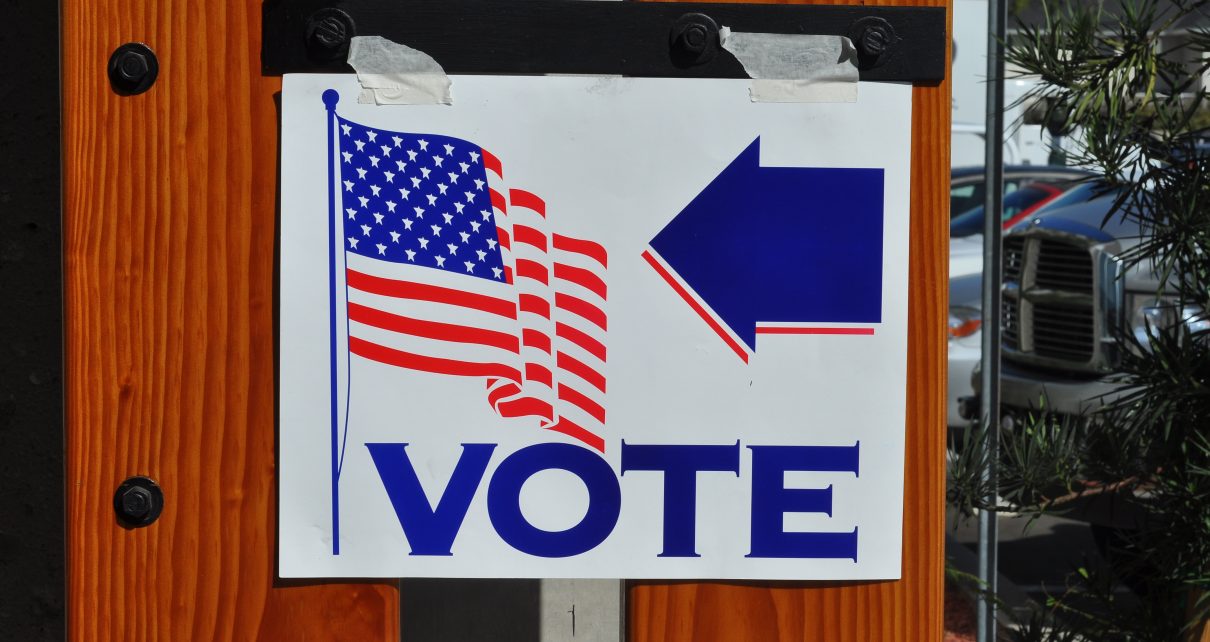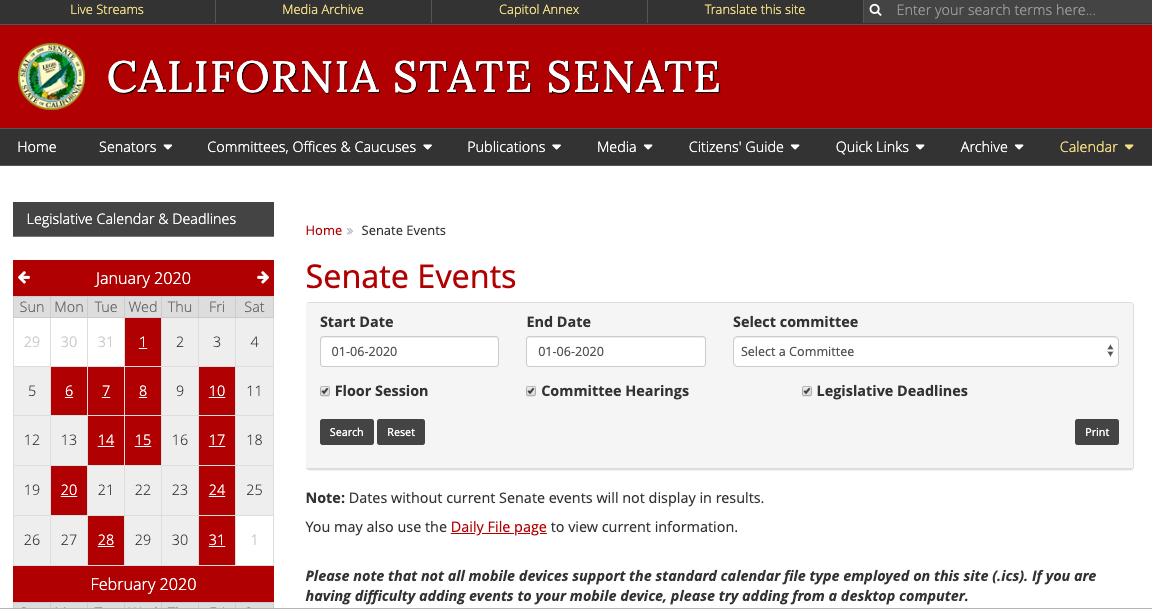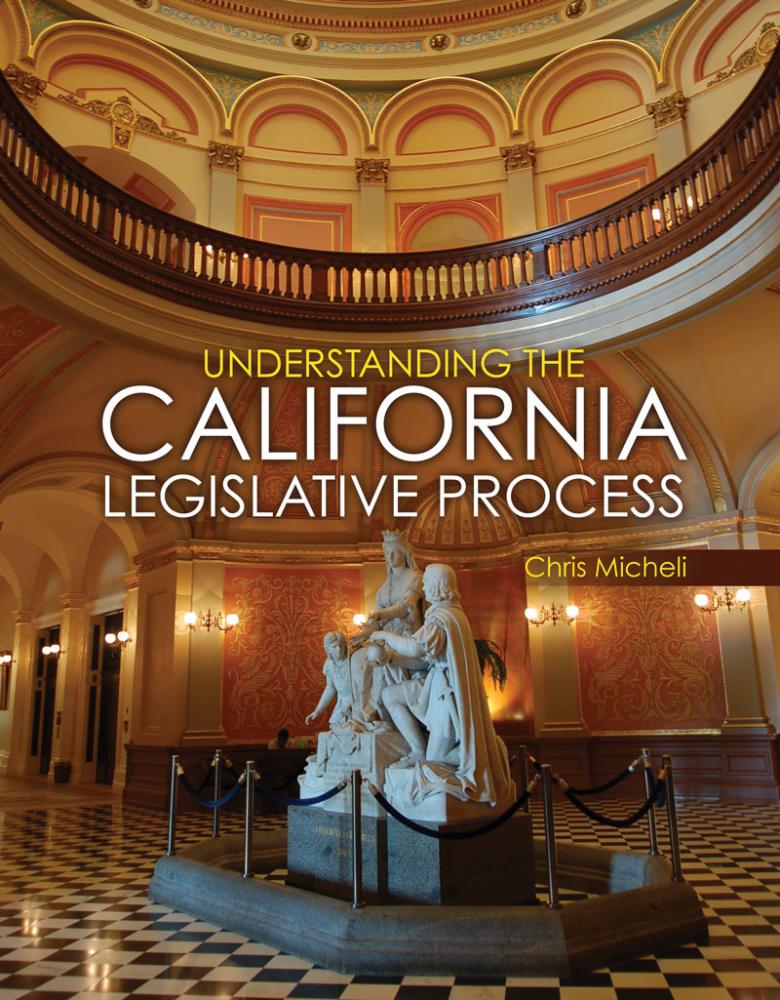
VOTE sign. (Photo: Wikipedia)
Proposed November Ballot Measures by the Legislature
Remote legislative proceedings, gambling and sports wagering, allowing 17-year-olds to vote, and racial preferences
By Chris Micheli, June 22, 2020 2:19 am
The Elections Code, absent an amendment, requires the Legislature to place measures on the statewide ballot by this Thursday, June 25.
California’s Legislative Counsel defines a constitutional amendment as “a resolution proposing a change to the California Constitution. It may be presented by the Legislature or by initiative, and is adopted upon voter approval at a statewide election.”
For constitutional amendments proposed by the Legislature, they are mentioned just once in Article IV, Section 8.5, which includes a provision for a “constitutional amendment proposed by the Legislature.” The term is not defined anywhere in the state’s constitution.
Thereafter, in Article 18, Section 1, “The Legislature by rollcall vote entered in the journal, two-thirds of the membership of each house concurring, may propose an amendment or revision of the Constitution and in the same manner may amend or withdraw its proposal. Each amendment shall be so prepared and submitted that it can be voted on separately.”
As a result, the Legislature can propose amendments to the California Constitution, so long as both the Assembly and Senate vote by a 2/3 majority to place the proposal on the statewide ballot (note that the Governor does not have a formal role in the adoption of proposed amendments), but the constitutional amendments are subject to a majority vote approval of the People for adoption.
At this point in the California Legislative Session, the following proposed constitutional amendments are pending:
ACA 4 (Mullin) Elections: Voting Age – set for hearing in Senate Elections & Constitutional Amendments Committee on June 23. The California Constitution authorizes any person who is a United States citizen, at least 18 years of age, and a resident of the state to vote. This measure would authorize a United States citizen who is 17 years of age, is a resident of the state, and will be at least 18 years of age at the time of the next general election to vote in any primary or special election that occurs before the next general election in which the citizen would be eligible to vote if at least 18 years of age. ACA 4 is a resolution to propose amending Section 2 of Article II.
ACA 5 (Weber) Government Preferences – set for hearing in Senate Appropriations Committee on June 23. The California Constitution, pursuant to provisions enacted by Proposition 209 in 1996, prohibits the state from discriminating against, or granting preferential treatment to, any individual or group on the basis of race, sex, color, ethnicity, or national origin in the operation of public employment, public education, or public contracting. This measure would repeal these provisions. The measure would also make a statement of legislative findings. ACA 5 is a resolution to propose repealing Section 31 of Article I.
ACA 6 (McCarty) Elections: Disqualification of Electors – set for hearing in Senate Appropriations Committee on June 23. The California Constitution requires the Legislature to provide for the disqualification of electors while mentally incompetent or imprisoned or on parole for the conviction of a felony. Existing statutory law, for purposes of determining who is entitled to register to vote, defines imprisoned as currently serving a state or federal prison sentence. This measure would direct the Legislature to provide for the disqualification of electors who are serving a state or federal prison sentence for the conviction of a felony. This measure would also delete the requirement that the Legislature provide for the disqualification of electors while on parole for the conviction of a felony. The measure would provide for the restoration of voting rights upon completion of the prison term. ACA 6 is a resolution to propose amending Sections 2 and 4 of Article II.
ACA 11 (Mullin) The Home Protection for Seniors, Severely Disabled, Families, and Victims of Wildfire or Natural Disasters Act – set for hearing in Senate Elections & Constitutional Amendments Committee on June 23. The California Constitution limits the amount of ad valorem taxes on real property 1% of the full cash value of that property and the appraised value of the property when purchased, newly constructed, or a change in ownership occurs after the 1975 assessment, subject to an annual inflation adjustment not to exceed 2%. This measure, beginning on and after April 1, 2021, would authorize an owner of a primary residence who is over 55 years of age, severely disabled, or a victim of a wildfire or natural disaster, as defined, to transfer the taxable value, defined as the base year value plus inflation adjustments, of their primary residence to a replacement primary residence located anywhere in the state, regardless of the location or value of the replacement primary residence, that is purchased or newly constructed as that person’s principal residence within 2 years of the sale of the original primary residence. The measure would limit a person who is over 55 years of age or severely disabled to 3 transfers under these provisions. The measure, beginning on and after February 16, 2021, would exclude from the terms “purchase” and “change in ownership” for purposes of determining the “full cash value” of property the purchase or transfer of a family home or family farm, as those terms are defined, of the transferor in the case of a transfer between parents and their children, or between grandparents and their grandchildren if all the parents of those grandchildren are deceased, if the property continues as the family home of the transferee. The measure would establish the California Fire Response Fund in the State Treasury and require the Controller to annually transfer a specified amount, based on calculations by the Director of Finance, the additional revenues and savings that accrued to the state from the implementation of this measure’s provisions from the General Fund to that fund. The measure would require the Legislature to appropriate moneys in the fund solely for the purpose of funding fire suppression staffing by the Department of Forestry and Fire Protection and underfunded special districts that provide fire protection services. The measure would also establish the County Revenue Protection Fund and continuously appropriate moneys in that fund for the purpose of reimbursing eligible local agencies. ACA 11 is a resolution to propose adding Sections 2.1, 2.2, and 2.3 to Article XIII A.
ACA 25 (Mullin) State of Emergency: Remote Legislative Proceedings – pending in Senate Rules Committee. The California Constitution requires the Legislature to convene in regular session on specified dates and provides that a majority of the membership constitutes a quorum, although a lesser number may recess from day to day and compel the attendance of absent members. The California Constitution requires the proceedings of each house of the Legislature to be open and public and recognizes the right of the public to attend, record, and broadcast those proceedings. The California Constitution authorizes the Legislature to provide for the convening of the Legislature to meet the needs resulting from a war-caused or enemy-caused disaster in the state. This measure would permit Members to remotely attend and vote in a legislative proceeding, or to vote by proxy in a legislative proceeding if permitted by their house, during the pendency of a state of emergency declared by the Governor or the President of the United States, under specified conditions. The measure would provide, among other conditions, that a Member may remotely attend and vote, or vote by proxy as authorized, in a proceeding only if the state of emergency prevents the Member from safely attending the proceeding in person. The measure would also provide that a Member attending remotely would be included in the determination of a quorum. The measure would provide that if 1/5 or more of the Members of a house cannot attend a proceeding during a state of emergency because they are deceased, disabled, or missing, a quorum may be established by a majority of those Members able to attend. ACA 25 is a resolution to propose adding Section 21.5 to Article IV.
SCA 6 (Dodd) Gambling: Sports Wagering – set for vote in Senate Appropriations Committee on June 23. The California Constitution prohibits various gaming activities within the state, including casino-style gambling, but authorizes the Governor, subject to ratification by the Legislature, to negotiate and conclude compacts for the operation of slot machines and the conduct of lottery games and banking and percentage card games by federally recognized Indian tribes on Indian lands in California in accordance with federal law. The California Constitution also authorizes the Legislature to provide for the regulation of horse racing, charitable bingo games, the California State Lottery, and charitable raffles. This measure would authorize regulated and taxed sports wagering, including online or mobile sports wagering, operated by horse race tracks and federally recognized Indian tribes. This measure would also authorize the Governor to negotiate and conclude compacts for sports wagering and for all banking and percentage games by federally recognized Indian tribes on Indian lands in California, which would include dice and roulette games. This measure would incorporate into the California Constitution the authority of a licensed gambling establishment to offer games played onsite with cards or tiles in which participants wager against each other, including games in which a participant known as the player-dealer wagers against the other participants, and would clarify that games played in this manner at a licensed gambling establishment are not banking or percentage games. SCA 6 is a resolution to propose amending Section 19 of Article IV.
In summary, the Legislature by a 2/3 majority vote (and no gubernatorial action) can place measures on the statewide ballot. The Elections Code, absent an amendment, requires the Legislature to do so by this Thursday, June 25. As such, there could be half a dozen measures placed on the November general election ballot by the California Legislature, in addition to those appearing on the ballot due to qualification as an initiative.
- Commercial Fishing - February 26, 2026
- Are These Extra Words Needed in California Statutes? - February 25, 2026
- Attorneys-in-Fact in Probate - February 25, 2026





ACA 5 is extremely racist legislation, designed to select students based on their skin color (racist against smart Whites and Asians).
Based on facts, including demographics, White people, especially heterosexual White males, created the very high standard of living in the United States, including California, all races enjoy.
The USA was almost 90 percent White until the deceptive Immigration and Nationality Act of 1965 flooded the country with non-White immigrants (the USA became an economic superpower by about 1890). Now, according to the Census Bureau. Whites will not be the majority by 2044.
The deceptive politicians pushing the new immigration legislation, said it was mostly symbolic it wouldn’t change demographics, they deceived congress people and the American population.
Historian Roger Daniels took note of the legislation’s cascading demographic effects and issued this somber judgment: “Had Congress fully understood its consequences, it almost certainly would not have passed.”
Now, powerful Hispanic and Black politicians in California want to make ACA 5 the law, so they can give government jobs, contracts and college enrollment to their favorite races, Hispanics and Blacks, sadly these politicians are the racists.
Eliminating talent and merit is going to, over time, severely harm the California economy and make race relations worse in California.
The measure actually is anti-racist.